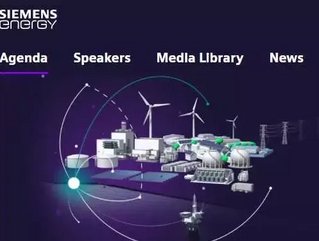Digital driving partnerships and leading to 'smarter ideas'

The digitalisation of the energy industry is firmly underway: that was a clear take-away message from today's hour-long discussion involving industry leaders at the Siemens Energy Shaping the Energy of Tomorrow online conference (MEA Energy Week), even if the manner in which it evolves remains constantly open to debate as companies grapple with the best course of direction amid the ever-changing pace of technology and economic uncertainties presented by COVID-19.
Khaled Al Blooshi (ADNOC VP Digital Projects and Innovation), Christiaan Van der Wouden (Operational Excellence, Oman Oil Company), Jennifer Hooper (SVP, Industrial Applications Solutions, Siemens Energy) and Abed Benaichouche (CTO, Group 42 Energy), debated a wide range of subjects in a panel entitled 'Digitalising the energy industry'. Often the discussion embraced complementary and divergent ideas at the same time as befits the myriad changes and fast-paced developments.
Take partnerships. These should be "top down" and "bottom up", was the consensus; similarly joint ventures blend the best of in-house knowledge with external expertise. The example of how an Italian company had blended management experience with tech-savvy youth was held up as digitalisation success. For Van de Wouden, digital is a "key enabler" for differentiating itself from the competition.
Al Blooshi said insurance premiums "should be lower" as the industry develops more predictive maintenance and de-risk tools. "Insurance companies will see the benefits of digitalisation if it reduces risk," added Van de Wouden, citing positive developments with electronic permits.
Hooper said digitalisation provides room for smarter ideas, whether that's robotics or automation, and represents a whole new way of working for an industry nurtured on "turning wrenches"; she said the journey is only just starting with Siemens Energy only finding applications for 5 percent of the data it is currently collecting. "We need to look beyond boundaries that exist today," she said.
Benaichouche said while efficiency in the industry stands at around 47 percent, upcoming developments - he highlighted quantum computing and blockchain - should increase it, and even a 2-5 percent global improvement would see significant changes. Following an 18-month pre-launch period, ADNOC recently launched the AIQ with Group 42 (ADNOC holds a 60 percent stake, G42 40 percent) in a bid to accelerate the development of new AI solutions to optimise processes, improve planning and increase profitability for ADNOC and the wider oil and gas industry.
In an earlier discussion, Majid Jafar, CEO of Crescent Petroleum, highlighted the need to co-ordinate global emissions, especially given one billion people have no access to electricity and three billion are still burning wood for their energy needs. "How can we achieve a global price of carbon? It needs to get global and if it's each country doing their own thing, it won't be fast enough."
Paraphrasing the environmental activist Greta Thunberg, he said: "We are rearranging the furniture while the living room is on fire."






